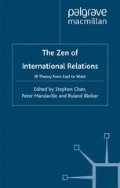Abstract
Since its inception, the discipline of international relations has struggled to establish the rigour of its methodological base in the academy, and it has struggled to establish whether and how it might have any moral place in the world. At the begining of the twenty-first century both struggles have reached a high point. Methodologically, the discipline has begun a transatlantic separation, with a USemphasis on neorealism and neoliberalism (both in its categorisations and its positivistic tendencies not a considerable departure from the interwar debate between realists and idealists), and a British concern not only for a historicised discipline, but for the intellectual history of the discipline itself. Steve Smith has written on ten self-images that international relations has held.1 Simultaneously, there has been a growing concern on both sides of the Atlantic, in Australia, and in Mervy Frost’s work from South Africa, with normative theory. This is meant to be both rigorous and emancipatory – although how it emancipates is not satisfactorily defined; in the postwar struggles, people may have needed ideology or religion, but seldom philosophy at the barricades. Nor is it clear how normative theory, drawn from enlightenment origins such as Hegel and Kant, or from postmodern figures such as Foucault, or from Habermasian critical theory, can establish norms for (let alone emancipate) those considerable parts of the globe where the Western enlightenment project never settled (such as China), which are premodern (such as the rural areas of much of Africa), and which have not so much a distinction between instrumental and ideal speech, but an ideal that one day it might be free to speak.
Access this chapter
Tax calculation will be finalised at checkout
Purchases are for personal use only
Preview
Unable to display preview. Download preview PDF.
Editor information
Editors and Affiliations
Copyright information
© 2001 Stephen Chan
About this chapter
Cite this chapter
Chan, S. (2001). Seven Types of Ambiguity in Western International Relations Theory and Painful Steps Towards Right Ethics. In: Chan, S., Mandaville, P., Bleiker, R. (eds) The Zen of International Relations. Palgrave Macmillan, London. https://doi.org/10.1057/9780230286429_4
Download citation
DOI: https://doi.org/10.1057/9780230286429_4
Publisher Name: Palgrave Macmillan, London
Print ISBN: 978-1-349-40097-3
Online ISBN: 978-0-230-28642-9
eBook Packages: Palgrave Political & Intern. Studies CollectionPolitical Science and International Studies (R0)

